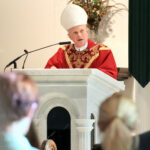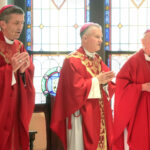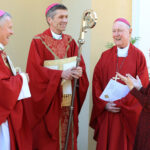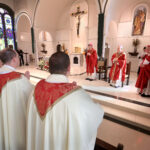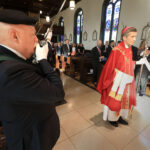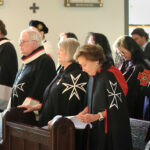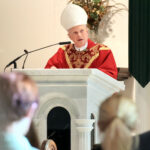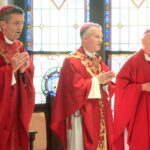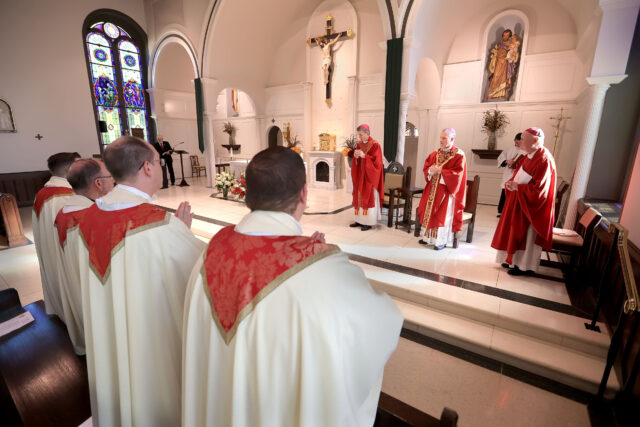
(Homily delivered at the Red Mass Oct. 6 for the St. Thomas More Society of the Diocese of Wilmington at St. Joseph on the Brandywine Church).
By Archbishop Timothy P. Broglio
Archdiocese of the Military Services
First of all, I am very grateful to Bishop Koenig for the invitation to join you this afternoon as we gather in prayer for all of those who administer justice. This morning I was able to concelebrate a similar Mass in Washington with the participation of many of your colleagues. It is so good to begin anything with a moment of prayer and a petition to Almighty God to bless our endeavors, especially upon those who are engaged in the service of others in respect for and guided by the principles of law.
Stories about wartime heroism are many. After the Nazi occupation of Italy, Giazza, a town a bit north of Verona, was oppressed by Nazi paratroopers. The Italian resistance would carry out raids, but frequently, the occupying forces were unable to identify those responsible for the attacks. Consequently, they would choose a number of people and punish or kill them.
Such was the case in Giazza when the parish priest, Father Domenico Mercante approached the commander to make a deal. “Shoot me instead of my flock,” he proposed. The commander accepted. When the firing squad was in place, one of the soldiers protested that he could not shoot an innocent man and went to stand by the priest. Of course, both were killed in a hail of bullets.
We do not know the name of the soldier, but he obviously understood that he could not be ordered to violate his conscience. He bore his share of the hardship of the Gospel with God-given strength. Years later at the dedication of a monument to the two, the Italian Minister of Defense stated: “The example of a priest and a soldier dying by the same rifle fire, in order that not only the written law but the unwritten law too should be respected, provides an example of great moral value.”
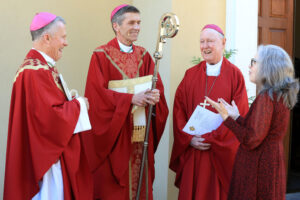
There is a great temptation to measure life, both spiritual and daily — only in terms of accomplishments, deeds, and those things in which I am the protagonist, the star. The soldier and priest illustrate what the sacred authors we have just heard teach us: to adhere to another vision. Faith is in a person who teaches us to depend on Almighty God and put everything in the perspective of eternal life. One commentator suggested that the Gospel passage reminds us to pray to God not for justice, but for mercy, because, just like the Apostles, we overestimate our accomplishments and underestimate his expectations.
However, thinking about the beginning of the Judicial Year and our prayer to the Holy Spirit so that you might be enlightened in your service, filled with justice, and enabled to meet the demands of your offices, St. Paul’s counsels to Timothy are appropriate. Do not forget that Paul is writing from prison — he already knows well what fidelity to the will of God costs. He keeps ever present the prize: everlasting life. That does mitigate the pressures of this world, popular opinion, or the News Journal or Delaware State News.
Paul talks about stirring the flame of faith. He is speaking about the grace of ordination, but we can apply the counsel also to graces of baptism or confirmation or perhaps even the noble aspirations that motivated a young law school graduate or a paralegal. The image is a good one: think about the embers of a fire; still smoldering, but they need some prodding to burst into flame.
The Apostle is writing about the strength of God to bear hardship, the human virtue of courage whose supernatural counterpart is called fortitude, one of the gifts of the Holy Spirit. That was one of the virtues of the paratrooper who joined Father Mercante in front of the firing squad. The other was wisdom, because he recognized what was morally acceptable and what not. We try to draw on both gifts as we navigate our way through life.
From the military imagery in this passage next to courage, the author adds compassion. It might seem to be an unusual combination, because we tend to think of the courageous as being hard, bold, and uncompromising. Compassion, which means to suffer with seems to be a soft, gentle virtue.
Yet, “these two different kinds of virtues in the soul are like the bones and the flesh in the body: they are equally necessary. We cannot afford to be either hard skeletons alone or soft flesh alone, either heartless or spineless, either dry skeletons or wet noodles.” We strive to find a balance.
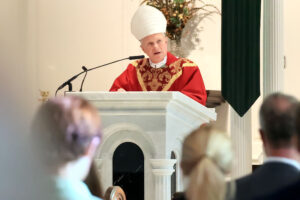
The prophet Habakkuk raises a perennial question: why? So much evil in the world? Violence? Why do our prayers seem to fall into a vacuum? He was writing in the VII century before Christ, but there seems to be little difference whether the questions are provoked by invading Chaldeans or by what we see on television.
The prophet tells us that the word of God will be accomplished. We may have to wait, but it will come about. We must trust in the Lord. Faith is fundamental to our Christian life. The Gospel uses the example of things, which, humanly speaking, are impossible. With faith they become possible. We strive to awaken that faith and to allow it to penetrate our lives. We pray that it might also influence our activities and responsibilities for others.
At the beginning of his pontificate Pope Benedict XVI called to mind the importance of the common good and wrote in his first encyclical: “To love someone is to desire that person’s good and to take effective steps to secure it. Besides the good of the individual, there is a good that is linked to living in society: the common good. It is the good of “all of us”, made up of individuals, families and intermediate groups who together constitute society[4]…. To desire the common good and strive towards it is a requirement of justice and charity. To take a stand for the common good is on the one hand to be solicitous for, and on the other hand to avail oneself of, that complex of institutions that give structure to the life of society, juridically, civilly, politically and culturally, making it the pólis, or “city”. … Every Christian is called to practice this charity, in a manner corresponding to his vocation and according to the degree of influence he wields in the pólis.”
We are justly proud of our constitutional system, but we know that even the highest systems are not immune. We need only recall the Dred Scott decision, the Sam Sheppard trial to name just two. “Justice is radically intolerant of injustice; justice seeks out injustice to destroy it. To emphasize security at the expense of eradicating injustice creates a fool’s paradise” The Romans put it more succinctly : “Justitia non novit patrem nec matrem; solum veritatem spectat justitia.” Justice knows neither father nor mother; justice looks to the truth alone.
I am reminded of my first year as a seminarian in Rome. An important 19th Century Justice Department building was closed because it was unsafe. It seemed to be sinking into the ground. Yet the Colosseum, Pantheon, and the ruins of the Roman Forum were all still standing and could be visited. It was a good reminder that not everything contemporary is good and that stable foundations are essential.
It is a wonderful foundation to invoke divine blessings on the administration of justice in the area served by the Diocese of Wilmington. I certainly want to wish you every success in your pursuit of justice in this year. May you be inspired by the charity of Father Mercante and commitment to the dignity of the human person manifested by the anonymous paratrooper.





